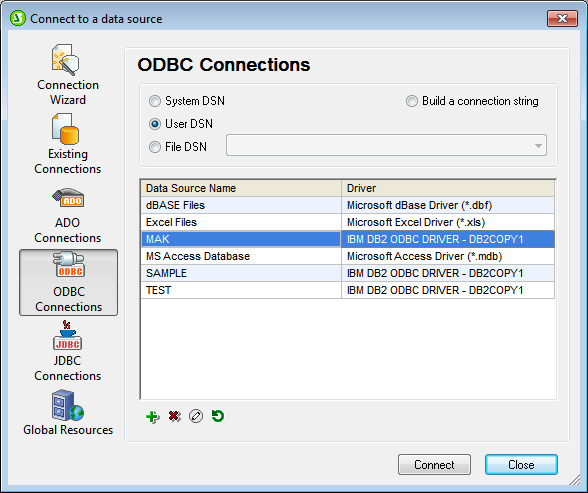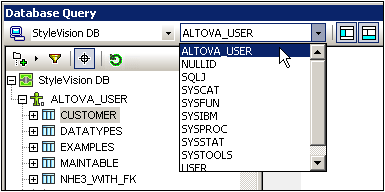Data Sources
In order to query a database, you have to first connect to the required database This section describes how to:
•Connect to a database, and
•Select the required data source and root object from among multiple existing connections.
Connecting to a database
When you click the Query Database command in the Database menu for the first time in a session (and when no database connection exists), the Connect to a Data Source dialog (screenshot below) pops up to enable you to connect to a database. To make connections subsequently, click the Quick Connect icon ![]() in the Database Query window. If connections already exist, you can select the required connection from among these.
in the Database Query window. If connections already exist, you can select the required connection from among these.

How to connect to a database via the Connect to a Data Source dialog is described in the section Connecting to a Data Source.
Supported databases
The table below lists all the supported databases. If your Altova application is a 64-bit version, ensure that you have access to the 64-bit database drivers needed for the specific database you are connecting to.
Database | Notes |
|---|---|
Firebird 2.x, 3.x, 4.x | |
IBM DB2 8.x, 9.x, 10.x, 11.x | |
IBM Db2 for i 6.x, 7.4, 7.5 | Logical files are supported and shown as views. |
IBM Informix 11.70 and later | |
MariaDB 10 and later | MariaDB supports native connections. No separate drivers are required. |
Microsoft Access 2003 and later | At the time of writing (early September 2019), there is no Microsoft Access Runtime available for Access 2019. You can connect to an Access 2019 database from Altova products only if Microsoft Access 2016 Runtime is installed and only if the database does not use the "Large Number" data type. |
Microsoft Azure SQL Database | SQL Server 2016 codebase |
Microsoft SQL Server 2005 and later Microsoft SQL Server on Linux | |
MySQL 5 and later | MySQL 5.7 and later supports native connections. No separate drivers are required. |
Oracle 9i and later | |
PostgreSQL 8 and later | PostgreSQL connections are supported both as native connections and driver-based connections through interfaces (drivers) such as ODBC or JDBC. Native connections do not require any drivers. |
Progress OpenEdge 11.6 | |
SQLite 3.x
| SQLite connections are supported as native, direct connections to the SQLite database file. No separate drivers are required.
In Authentic view, data coming from a SQLite database is not editable. When you attempt to save SQLite data from the Authentic view, a message box will inform you of this known limitation. |
Sybase ASE 15, 16 | |
Teradata 16 |
Selecting the required data source
All the existing connections and the root objects of each are listed, respectively, in two combo boxes in the toolbar of the Database Query window (screenshot below). After selecting the required data source in the left-hand combo box, you can select the required root object from the right-hand combo box.

In the screenshot above, the database with the name StyleVision DB has been selected. Of the available root objects for this database, the root object ALTOVA_USER has been selected. The database and the root object are then displayed in the Browser pane.